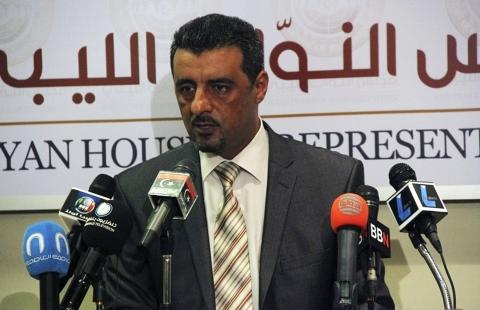Advertisement
Libya's parliament to open dialogue with members from opposing city
TOBRUK Libya (Reuters) - Libya's elected parliament will hold its first talks on Monday with members from an opposing city linked to a rival assembly, lawmakers said, starting a badly needed dialogue as the oil-producing country teeters on the edge of collapse.
The House of Representatives, the internationally recognised parliament elected in June, was uprooted last month when an armed group from the western city of Misratatook control of the capital Tripoli and set up its own assembly and cabinet there.
The meeting in Ghadames, a southern town near the Algerian border, was brokered by the United Nations in an attempt to prevent the country from descending into anarchy and civil war, three years after the uprising that ended the 42-year-rule of Muammar Gaddafi.
Faraj Hashem, spokesman for the House of Representatives which has moved to the remote eastern city of Tobruk, said the talks would include only elected deputies from Misrata, who have boycotted the house's sessions since it was convened in August.
"We welcome the dialogue but it will be (only) with the deputies who have boycotted the previous sessions," he told Reuters.
There would be no talks with armed groups from Misrata or other parts of Libya which have reinstated the country's previous parliament, he said. "This is a principal condition."
Tripoli lawmaker Ali Tekbali said he expected little from the meeting, brought about by contacts in the past few weeks between U.N. Special Libya envoy Bernardino Leon and the opposing factions.
"I don't think it will achieve much because the talks will not include the militias. The deputies have no power over them," he said.
Other lawmakers and diplomats welcome the prospect of talks in the vast desert country, where the rebel groups that ousted Gaddafi are now fighting for power and a share of oil revenues.
They hope that since Misrata-members from the house are indirectly linked to the rival parliament in Tripoli the meeting will start a broader political dialogue, not just about the House of Representatives.
A previous U.N. initiative for a national dialogue, planned before fighting in Tripoli escalated in July, had failed amid a public outcry, with the world body coming under criticism for alleged interference.
Hours before details of the meeting emerged, Prime Minister Abdullah al-Thinni and his cabinet took the oath of office after lawmakers approved the line-up.
Last week the House of Representatives agreed on a second cabinet list after rejecting an initial 16-member one as too large.
The new cabinet has 13 ministers including three deputies for Thinni and no oil minister. The vital oil sector will be run by state firm National Oil Corp (NOC), as it was under Gaddafi.
Thinni, a former career soldier, has been prime minister since March but had resigned after a June election. Lawmakers then asked him to again form a new government.



















Add new comment